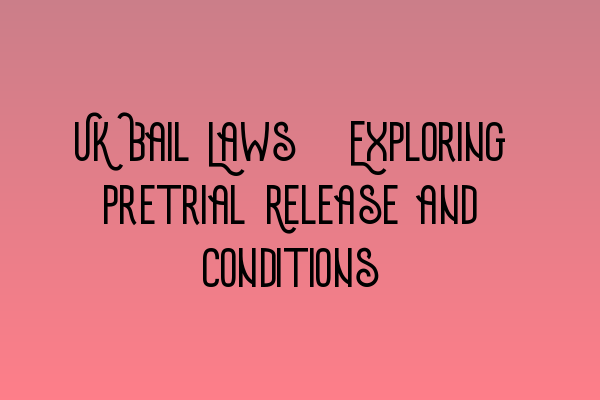UK Bail Laws: Exploring Pretrial Release and Conditions
When someone is arrested and charged with a criminal offense in the United Kingdom, they may have the opportunity to be released on bail pending their trial. Bail is a legal process in which a person accused of a crime is released from custody, with certain conditions, while they await trial. This blog post will delve into the intricacies of UK bail laws, including pretrial release and the conditions that may be imposed.
Understanding Pretrial Release
Pretrial release, also known as bail, allows a defendant to be released from custody before their trial. This means that the accused can return to their normal life, attend work, and continue with their daily responsibilities while awaiting their court date. Pretrial release is granted based on several factors, including the nature of the offense, the defendant’s criminal history, community ties, and the likelihood of the defendant appearing in court.
In the UK, there are three types of pretrial release: police bail, court bail, and conditional bail. Let’s take a closer look at each of these options:
Police Bail
When someone is arrested, the police have the power to release them on bail. Police bail allows the accused to be released from custody without appearing in court. However, the police may impose specific conditions on the person, such as reporting to a police station regularly or refraining from contacting certain individuals involved in the case.
If the police decide not to charge the individual, they will be released without conditions. But if charges are filed, the case will proceed to court, where the defendant may seek court bail.
Court Bail
Court bail is granted by a judge or magistrate during a court hearing. The court will consider various factors, including the seriousness of the offense, the defendant’s criminal record, the likelihood of them appearing in court, and the potential risk to the public if the defendant were to be released.
If court bail is granted, the accused may be released with or without conditions. The conditions imposed can vary widely and may include surrendering their passport, residing at a specified address, adhering to a curfew, or staying away from certain individuals or places.
Conditional Bail
Conditional bail is a type of court bail that includes specific conditions to be followed by the accused while awaiting trial. These conditions may be related to the safety of the victim, the protection of witnesses, or the prevention of further offenses. Failure to comply with the conditions can result in the revocation of bail.
Implications and Considerations
The granting of bail is not an automatic right. It is up to the court to assess whether an individual should be released before their trial, taking into account the aforementioned factors. The primary consideration is always the risk of the accused failing to appear in court.
In addition to ensuring the defendant’s appearance in court, bail laws aim to strike a balance between protecting the rights of the accused and the interests of justice. The conditions imposed can be restrictive, but they are necessary to safeguard the well-being of the community and the smooth administration of justice.
It is also essential to note that breaching the conditions of bail can have serious consequences. If the defendant fails to comply with the specified conditions, they may be arrested and held in custody until their trial or until bail is granted again under different terms.
Conclusion
Bail laws in the UK serve a crucial role in the criminal justice system. Pretrial release allows individuals accused of crimes to maintain their freedoms while awaiting trial, but it is accompanied by specific conditions designed to protect the public and ensure the defendant’s appearance in court. The decision to grant bail and the conditions imposed are carefully considered to strike a balance between the interests of justice and individual rights.
For further information on related legal topics, we recommend reading our articles on SQE 1 Practice Exam Questions, SQE 1 Practice Mocks FLK1 FLK2, SQE 2 Preparation Courses, SQE 1 Preparation Courses, and SRA SQE Exam Dates.
